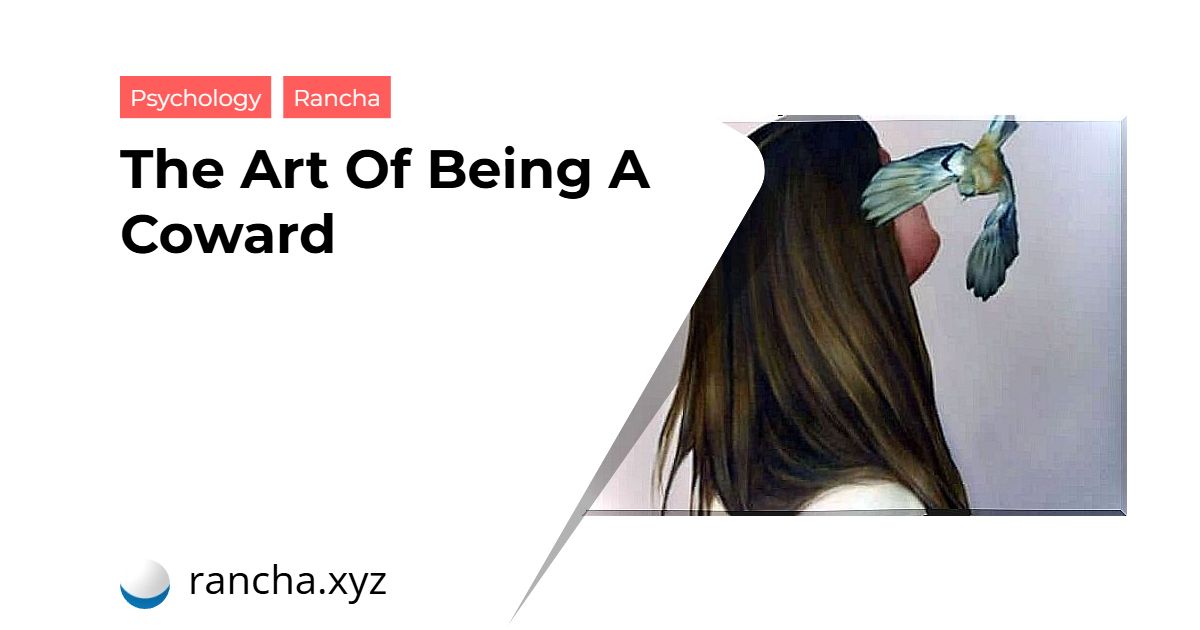Do you know anyone you could define as a coward? What are the reasons why you define this person like that? Is it possible to justify the way she acts? At work, in the family, in groups of friends… we all have someone around that we can label a coward. Cowardice is one of the essential characteristics of the human being. It is very widespread, easily identified in others, but little recognized. However, and this is perhaps surprising, in certain cases it remains an adaptive strategy for us.
On several occasions, we have all looked back and faced a question: to know what the result would have been if we had acted differently at any given time. And on analysis, we see that cowardice is behind many of our “ what ifs…”. Cowardice goes hand in hand with fear and conformity. They are inseparable. If there is no fear behind it, it is not cowardice; perhaps self-indulgence or laziness, but not cowardice. It is possible to be a coward in several dimensions of this aspect. At the emotional level, at the behavioral level, or even at the thinking level.
How to be a coward?
There are several ways to demonstrate cowardice. The most evident is the one perceived in behavior. Beyond what we can feel or think, there are times when the situation demands our action and we don’t act. It is a reflection of “non-reaction” due to stoppage, insecurity… we can put a thousand justifications. This is the best known and most visible form of cowardice. We can recognize in other people or in ourselves several moments when we don’t say “I love you”, “leave me alone”, “no, this is your job, do it yourself”…

How many times have we pushed thoughts out of our mind so we don’t think about them? We can also be thought cowards. It may be that there is an idea, a situation or even a memory that bothers us or causes us fear and we push it away. We don’t even question ourselves because we know it can give us a “knot” in our stomach or make our breathing faster. When we’re prompted to talk about it, we run away, change the subject, or show forced indifference.
And lastly, the emotional coward. Not feeling so as not to suffer. Running away from emotions is the solution for many people. They understand an emotion as a complication. Those people who get carried away by emotions don’t understand them. But behind those who run away from feelings of fear, sadness, affection, anger, there are specific reasons. These can be related to difficulties in recognition, expression and empathy in childhood or adolescence, bad experiences as adults, and even the fear of losing impulse control.
Why do we behave this way?
Whether we are the cowards, or whether it is someone we know, the feeling in relation to cowardice is one of incomprehension, disappointment and even anger. Why do these people behave like this? Why do I behave like this? For both the brave and the cowardly, the answer is the same. A fundamental modulator of our prowess is related to the quantity and quality of the tools and the personal training we have and carry out.

Fear is an emotion shared by everyone, however, cowardice is an attitude: the position we adopt towards this fear. Besides, it’s possible to act even with fear. It’s logical and human. The tools with which we learn to deal with our emotions to respond in a balanced way or to put into practice thinking strategies aimed at solving problems, generating alternatives, will guide our behavior in one direction or another.
From then on, cowardice is an element we will have to deal with. Whether it’s about ourselves or others, we would do well to rely on empathy, trying to understand (not necessarily support) the reasons why we were cowards. If there is fear, develop tools to learn, listen to other people, reflect, share your fears and practice.
At work, in personal relationships or even in some activity that you know you are very afraid of… fight cowardice. Start from the idea that there is no black and white, the “all or nothing” are exceptions and not the rule. There are degrees of advancing little by little and leaving behind that feeling of thinking, acting or feeling overwhelmed by cowardice.
 rancha.xyz Be free to choose their own route to self-knowledge, health and balance of body and soul.
rancha.xyz Be free to choose their own route to self-knowledge, health and balance of body and soul.




